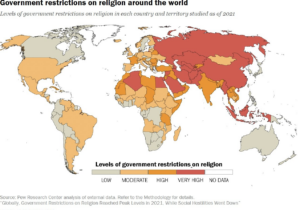A year before America entered World War II, President Franklin Roosevelt shared his vision of “a world founded upon four essential human freedoms”: freedom of speech, freedom from fear, freedom from want and “freedom of every person to worship God in his own way—everywhere in the world.” FDR asserted these Four Freedoms in a speech about “the democratic way of life…being directly assailed in every part of the world” by a “new order of tyranny.” Today, the civilized world is under assault from a disorder of tyranny and terror. The enemies of religious freedom abound. But as a recent State Department report reveals, some regimes are set apart when it comes to religious repression:
- According to the U.S. Commission on International Religious Freedom (USCIRF), the Iranian government is guilty of “ongoing and egregious violations of religious freedom, including prolonged detention, torture, and executions.” Iranian Christians are scourged for drinking communion wine—80 lashes was the punishment in 2013.
- Saudi Arabia is a place where “not a single church or other non-Muslim house of worship exists,” where promoting “unbelief” is a crime, where even private religious practice is illegal, according to USCIRF.
- In China, according to USCIRF, “Independent Catholics and Protestants face arrests, fines, and the shuttering of their places of worship.” Buddhists, Muslims, folk religionists, and Protestant worshippers are subjected to “jail terms, forced renunciations of faith, and torture” as well as property destruction. Freedom House reports “hundreds of thousands” of religious adherents are sentenced to forced labor.
- “Thousands of religious believers and their families are imprisoned in penal labor camps” in North Korea, according to USCIRF. A UN panel finds in North Korea a “complete denial of the right to freedom of thought, conscience, and religion.”
- Sudan prohibits conversion from Islam and demolishes houses of worship.
- Tajikistan bars Muslim women from attending mosques and prohibits people under 18 from public worship. Turkmenistan has carried out a systematic campaign of “beatings and torture of persons detained for religious reasons.” The Uzbek government raids religious gatherings.
- Burma tolerates violence against Christians and prohibits Muslims from land ownership.
- According to USCIRF, religious freedom in Pakistan has “hit an all-time low due to chronic sectarian violence” targeting Shiites, Christians, Ahmadis, and Hindus, with the Pakistani government often failing to intervene to protect these groups.
- In Russia, blasphemy laws curtail “the freedoms of religion, belief, and expression,” according to USCIRF, which adds that Moscow prosecutes Muslims without evidence, issues baseless fines against Protestant churches, and denies permits for Mormon, Armenian Catholic, and Muslim houses of worship.
This litany should matter to anyone who believes in human rights. But this assault on religious liberty isn’t just about ideals. It’s also about national interests. After all, an annual index of failed and failing states places all of the above countries in its at-risk or high-risk categories. Failed and failing states generate most of the world’s worries—and trigger most of the world’s wars nowadays: The U.S. has engaged in military operations in nine of the bottom 13 failed states over the past 20 years.
Of course, some of today’s gravest threats to religious liberty are non-state groups like ISIS and the Taliban. The Taliban banished girls from school, launched poison-gas attacks against schools, ordered Hindus to wear identity labels, beheaded people for dancing, turned soccer stadiums into execution chambers, burned people alive, imprisoned Christian missionaries, and allowed bin Laden to turn Afghanistan into a training ground for his global jihad. ISIS (whose adherents are Sunni Muslim) has executed hundreds of Shiite Muslims, subjected Yazidi and Christian women to mass-rape and sex slavery, orchestrated mass-beheadings of Egyptian Christians, and targeted Assyrian Christians for abduction.
University of Texas professor William Inboden notes that “every major war the United States has fought over the past 70 years has been against an enemy that also severely violated religious freedom.” He sees a clear “correlation between religious persecution and national-security threats.”
Regimes that have no respect for religion see no limits on their power. Since they believe nothing is above the state, they can rationalize everything they do in the name of the state, the fatherland, the revolution. Regimes and groups at the opposite end of the spectrum—those that see themselves as instruments of their god—end up at the same destination. Since they believe they are acting on behalf of their god, they can rationalize everything they do in the name of their god.
This isn’t to suggest that America should go to war against every enemy of religious liberty. But perhaps we shouldn’t cut deals with Tehran, take Putin at his word, draw a line of moral equivalence between Israel and Hamas, withdraw from the Mideast, or avert our gaze from the latter-day gulags in China.
Religious liberty is important to God. Moses’ interaction with Pharaoh was primarily about religious liberty. Speaking through Moses, the Lord declared, “Let my people go so that they may hold a festival to me in the desert.”
Jesus interacted with pagans, polytheists, Jews, gentiles, Greeks, Samaritans, and Syrophoenicians. He had the power to make all of them bow to Him, but He never did. Instead, He practiced religious tolerance.
Jesus lived among religious zealots and self-appointed holy men who were willing to kill to prove their piety. He could have joined them or led them, but He never did. Instead, He modeled religious liberty. Look at Luke 9. A Samaritan village refused to let Jesus stay there “because He was heading for Jerusalem.” As one commentary explains, “Samaritans were particularly hostile to Jews who were on their way to religious festivals in Jerusalem.” But Jesus didn’t make them accept Him. When James and John asked “to call fire down from heaven to destroy” the village, Jesus rebuked them. More on this at byFaith.
Alan Dowd is a contributor to the Providence journal’s daily blog.
Image Credit: “Freedom of Worship” by Norman Rockwell






